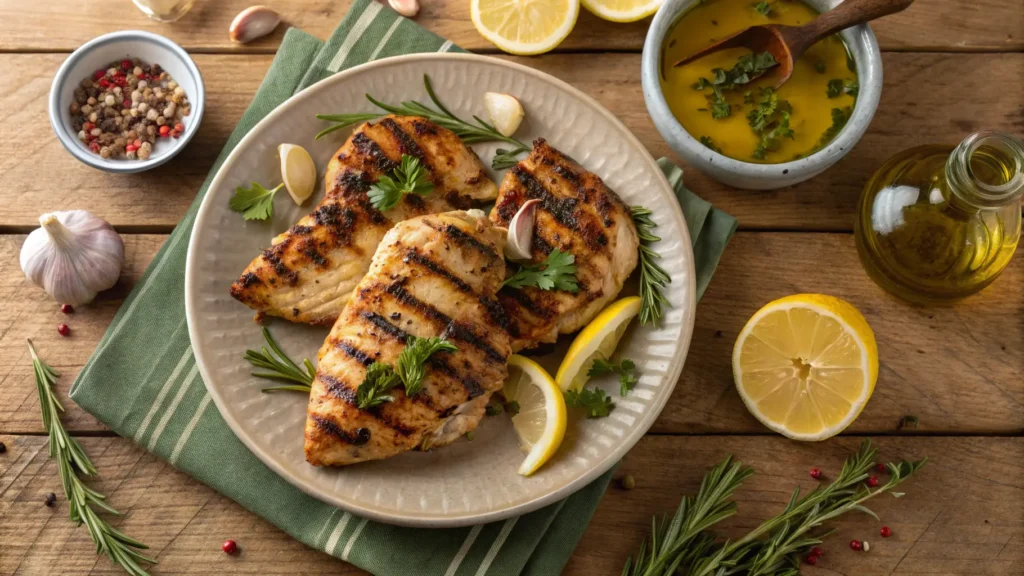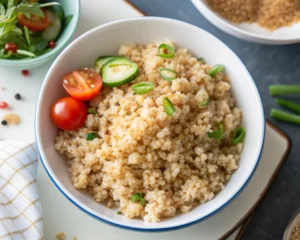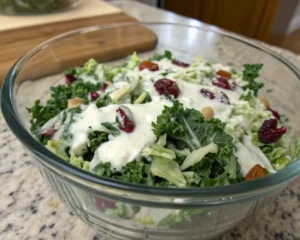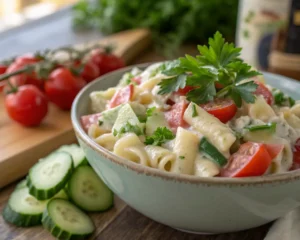Marinating chicken is a popular way to make it tender, juicy, and full of flavor. But here’s the catch—marinating isn’t just about mixing up a flavorful liquid and letting the chicken soak. The time it stays in the marinade matters a lot! Marinate too short, and you might not get the flavor you want. Marinate too long, and things could go sideways with mushy, overpowered chicken. This article dives into everything you need to know about how long chicken should stay in a marinade and the science behind it.
We’ll start with the basics: what marinating is and why it’s a game-changer. Then, we’ll get into the nitty-gritty details, like how marinade types and chicken cuts impact the timing. You’ll learn about ideal marinating times for different cuts and what happens if you go overboard. Plus, we’ll share safe marinating practices, handy tips, and answers to some burning questions about marinating chicken. Let’s dig in!
Table of contents
Introduction to Marinating Chicken
What is Marinating?
Marinating is like giving your chicken a flavor bath. It’s the process of soaking food in a liquid mixture of seasonings, spices, oils, and acids to add flavor and sometimes improve texture. Think of it as a way to make chicken more exciting to eat—like turning plain chicken into something you’ll crave.
The marinade doesn’t just sit on the surface. Acids like vinegar or lemon juice help tenderize the chicken, while oils lock in moisture. Herbs, spices, and other flavors seep into the meat, creating delicious layers of taste. The result? A flavorful, juicy bite every time.
Why Marinate Chicken?
Marinating chicken isn’t just about taste. It also affects how the chicken cooks and feels in your mouth. Here are a few reasons why you should marinate:
- Boost flavor: Marinades infuse the chicken with herbs, spices, and seasonings.
- Tenderize the meat: Acids and enzymes break down proteins, making the chicken softer.
- Retain moisture: Oils and liquids in the marinade help the chicken stay juicy while cooking.
For instance, a quick 30-minute marinade can make a weeknight chicken dinner much more flavorful, while an overnight soak works wonders for a weekend BBQ feast.
Marinating is super versatile too. Whether you’re grilling, baking, or frying, there’s a marinade recipe for every method. But remember, not all marinades or chicken cuts are the same—so timing is everything!
The Science of Marinating Chicken
How Marinades Work
Marinating might seem like magic, but it’s actually simple science. When you soak chicken in a marinade, a few key ingredients—acids, oils, and seasonings—work together to enhance its flavor and texture. The acids (like lemon juice or vinegar) break down proteins in the chicken, making it tender. Oils, on the other hand, lock in moisture, so your chicken doesn’t dry out when cooked. Finally, herbs, spices, and other flavor-packed ingredients seep into the meat for a tasty finish.
Here’s how it all comes together:
- Acids: These are the heavy lifters of tenderizing. They change the texture of the chicken by breaking down its structure.
- Oils: Help distribute flavors evenly and keep the chicken juicy.
- Seasonings: Add the punch! Garlic, herbs, and spices bring unique flavors to your dish.
But, there’s a catch! The marinade doesn’t penetrate very deeply into the meat. It mostly sticks to the surface, so the type of chicken cut and marination time are super important.
For a flavorful recipe idea, check out the Mexican Chicken Marinade for a zesty kick!
Key Ingredients in a Marinade
Not all marinades are created equal. The best ones strike a balance between acids, oils, and seasonings. Let’s break it down:
- Acidic components: Lemon juice, lime juice, yogurt, or vinegar help with tenderizing.
- Fats: Olive oil or avocado oil enhances moisture and adds richness.
- Flavor boosters: Garlic, onion, cumin, paprika, and fresh herbs (like cilantro or parsley) amplify taste.
If you’re using stronger acids like vinegar, limit marinating time to prevent over-tenderizing. And remember, a little oil goes a long way in balancing the texture.
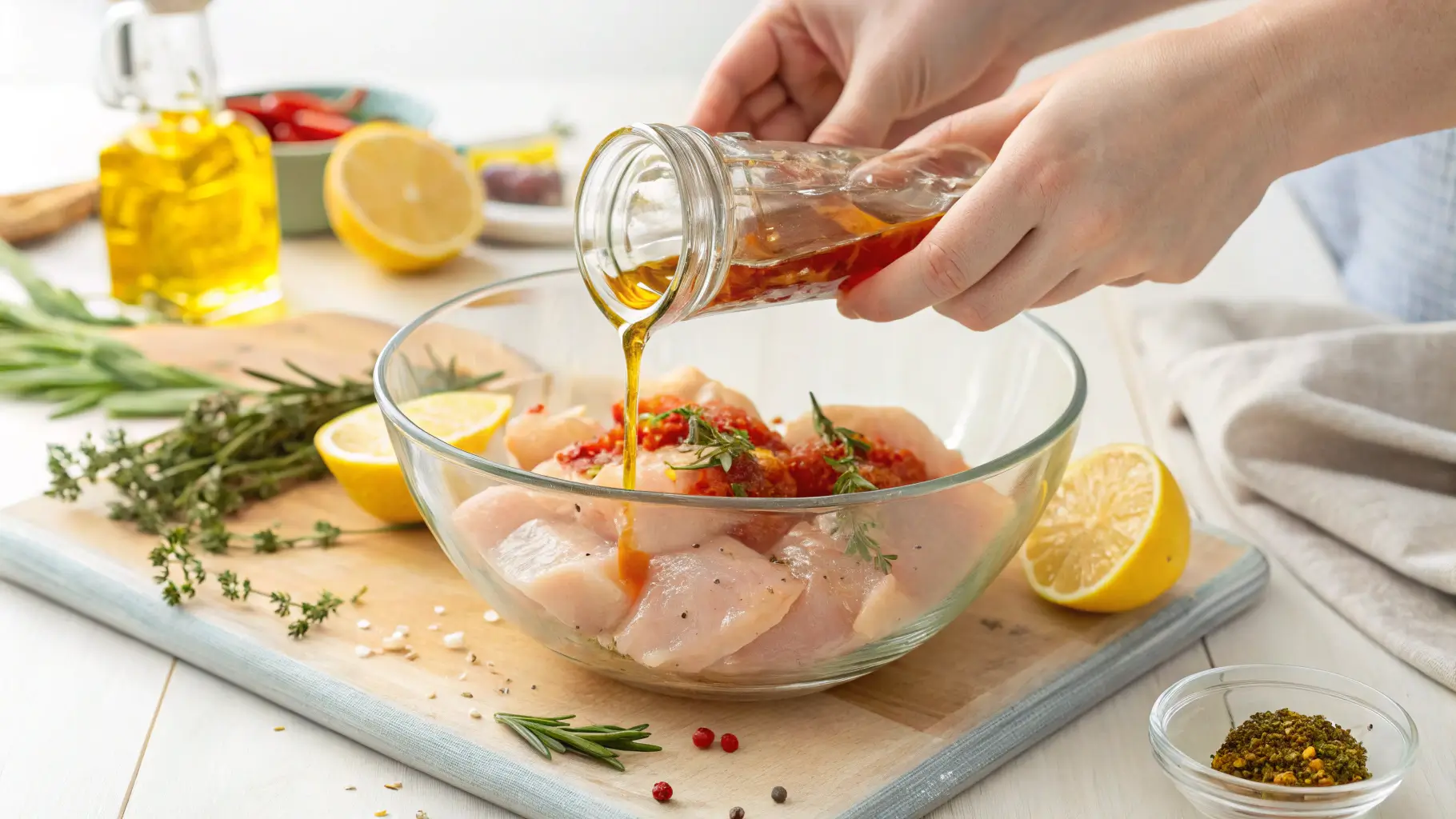
Factors Affecting Marinating Time
Type of Marinade
The type of marinade you use can drastically change how long chicken should stay in it. Acid-based marinades are quick to tenderize but can make the meat mushy if left too long—anywhere from 30 minutes to 2 hours works well. On the other hand, enzymatic marinades (like pineapple or papaya juice) act even faster and should be used sparingly for just 15–30 minutes.
Neutral marinades that use oils and seasonings without acids are more forgiving. You can leave chicken in these marinades for up to 24 hours without worrying about texture issues.
Quick Tip: If you’re in a hurry, a simple acidic marinade can work wonders in just 30 minutes!
Cut of Chicken
Different chicken cuts require different marinating times. For example:
- Chicken breasts: These need less time—30 minutes to 2 hours is plenty.
- Thighs and drumsticks: These cuts are thicker and more flavorful, so they can handle 4–6 hours.
- Whole chicken: It’s best to marinate this overnight (8–12 hours) for the flavors to fully develop.
Bone-in cuts generally take longer because the marinade takes time to penetrate around the bones. Keep in mind, over-marinating is just as bad as under-marinating—it can ruin the texture and taste.
Ideal Marinating Times for Different Types of Chicken
Chicken Breasts: Short and Sweet
Chicken breasts are lean and can quickly soak up the flavors of a marinade. For this cut, marinating for 30 minutes to 2 hours is ideal. The thinner the breast, the faster the marinade works. Over-marinating, especially with acidic marinades, can make the meat tough or rubbery, so it’s best to keep the timing short and sweet.
If you’re in a pinch, even a quick 20-minute marinade can deliver great results. But, for richer flavors, aim for the 2-hour mark. This makes a significant difference whether you’re grilling, baking, or pan-searing your chicken.
Chicken Thighs and Drumsticks: Longer is Better
Thighs and drumsticks are packed with natural flavors and can handle longer marinating times. For these cuts, 4 to 6 hours is a great window. Their higher fat content helps them stay moist, even during prolonged marination.
When using mild marinades, you can even go up to 12 hours. However, for acid-heavy mixes, stick to the lower end of the range to avoid texture changes.
Pro Tip: Bone-in drumsticks absorb marinades slower than boneless pieces, so give them a little extra time if possible.
Whole Chicken: Overnight Magic
Marinating a whole chicken requires time and patience. An overnight marinade (8–12 hours) ensures the flavors reach deep into the meat, especially if you’re roasting or grilling. To get the best results:
- Use a large zip-lock bag or a covered container to ensure even coating.
- Turn the chicken occasionally to distribute the marinade evenly.
If you’re short on time, try a simple marinade for 4–6 hours. While it won’t be as flavorful as overnight, it’s still a big step up from skipping marination altogether.

Tips for Short and Long Marination
- Short on time? Stick to a quick 30-minute marinade for breasts or thighs.
- Planning ahead? Overnight marination works best for whole chickens or thicker cuts.
- Want maximum flavor? Pierce the chicken lightly with a fork before marinating to help the liquid penetrate.
What Happens if You Over-Marinate Chicken?
Effects on Texture: Mushy Isn’t Tasty
Over-marinating chicken, especially with acidic or enzymatic marinades, can lead to mushy meat. Acids like lemon juice or vinegar break down proteins, which is great for tenderizing, but too much can go too far. When left too long, the meat’s structure collapses, turning it into a soggy, unappetizing mess.
To avoid this, always stick to the recommended marinating times:
- Breasts: Max 2 hours.
- Thighs and drumsticks: Max 6 hours (or less for acidic marinades).
- Whole chicken: Overnight, but no more than 12 hours.
Flavor Imbalance: When Too Much Is Too Much
While marinades are great for adding flavor, overdoing it can overwhelm the natural taste of the chicken. For instance, a strong garlic or soy sauce-based marinade left for too long can overpower everything else. This leaves you with chicken that tastes only like the marinade—not the delicious mix of chicken and seasoning.
Stick to mild marinades for longer durations, and avoid heavy or overly salty marinades if you’re marinating overnight.
Safe Marinating Practices
Food Safety Tips
Marinating chicken is not just about flavor—it’s also about safety. To avoid foodborne illnesses, always refrigerate chicken while it marinates. Leaving it out at room temperature increases the risk of bacteria growth, which can ruin your meal and harm your health.
Here are a few simple rules to follow:
- Use airtight containers: Glass or food-safe plastic containers are best for holding marinades. Avoid metal containers, as acids can react with them.
- Keep it cold: Always marinate chicken in the fridge, especially if the marination time is more than 30 minutes.
- Don’t reuse marinade: If you plan to use the marinade as a sauce, boil it first to kill bacteria.
Pro Tip: Wondering how long should chicken stay in a marinade safely? Follow the timing guidelines in earlier sections, and remember that refrigeration is key.
Using Marinades Safely
Marinades are packed with flavor, but handling them improperly can be risky. For example, if you’re basting chicken during cooking, never use leftover marinade that has touched raw chicken without boiling it first. This eliminates any harmful bacteria.
Here’s how to use marinades safely:
- Reserve some marinade: Before adding raw chicken, set aside a portion of the marinade for basting or as a sauce.
- Cook thoroughly: Make sure chicken is cooked to an internal temperature of 165°F (75°C).
These simple practices can keep your food both flavorful and safe!
Quick and Easy Chicken Marinade Tips
Basic Marinade Recipes
Creating a great marinade doesn’t have to be complicated. In fact, you can whip up a simple, delicious marinade in minutes with just a few pantry staples. Here are two quick recipes to try:
- Citrus Garlic Marinade
- 2 tablespoons olive oil
- Juice of 1 lemon
- 2 minced garlic cloves
- 1 teaspoon oregano
- Salt and pepper to taste
- Soy Ginger Marinade
- 1/4 cup soy sauce
- 1 tablespoon sesame oil
- 1 teaspoon grated ginger
- 1 teaspoon honey
- 1 chopped green onion
Both recipes work wonders whether you marinate for 30 minutes or overnight, depending on your chicken cut.
Tips for Better Marinating
Making your chicken marinade experience hassle-free is all about small tricks. Try these tips:
- Use zip-lock bags: They save space and ensure even coating of the chicken.
- Tenderize the meat: Gently pound chicken breasts to even thickness before marinating.
- Don’t overdo it: Remember, how long should chicken stay in a marinade depends on the type of cut and the marinade ingredients.
Experimenting with different marinades and cooking methods is a great way to discover what works best for you. Whether it’s a quick weeknight meal or a special occasion, these tips will have you covered.
FAQs on Marinating Chicken
How Long Should You Marinate Chicken?
One of the most common questions is, “How long should chicken stay in a marinade?” The answer depends on the type of chicken and the ingredients in the marinade. For quick results, chicken breasts can be marinated for as little as 30 minutes, while whole chickens benefit from an overnight soak of up to 12 hours. Remember, leaving chicken in a marinade for too long, especially acidic ones, can make the texture mushy.
Can You Freeze Chicken in a Marinade?
Yes, you can freeze chicken in a marinade! This is a fantastic way to save time and lock in flavor for future meals. To do this, place your chicken and marinade in a freezer-safe bag, remove excess air, and freeze for up to 3 months. When you’re ready to cook, thaw the chicken in the fridge overnight. Freezing actually helps intensify the flavor, so it’s a win-win.
What Happens if You Don’t Marinate Chicken?
Skipping marination doesn’t mean your chicken will taste bad, but it might lack that extra punch of flavor and tenderness. Marinating infuses the chicken with delicious layers of taste that are hard to achieve otherwise. If you’re short on time, even a 15-minute marinade can make a noticeable difference.
Can You Over-Marinate Chicken?
Absolutely. Over-marinating, especially with acidic or enzymatic marinades, can break down the proteins too much and turn your chicken mushy. It’s essential to stick to the recommended times for each type of cut and marinade. If you’re not sure how long should chicken stay in a marinade, always err on the side of caution.
Conclusion
Summing Up the Ideal Marinating Time
Marinating chicken can elevate your meals, but timing is everything. The key takeaway is this: how long should chicken stay in a marinade depends on the type of chicken and the marinade ingredients. Whether it’s a quick 30-minute soak or an overnight infusion, the right timing ensures your chicken is flavorful and perfectly textured.
Encouragement to Experiment
Now that you know the ins and outs of marinating, it’s time to experiment! Try different marinades, cooking methods, and marinating times to find what works best for your taste buds. Whether it’s a family dinner or a weekend BBQ, properly marinated chicken will always steal the show.

